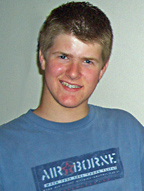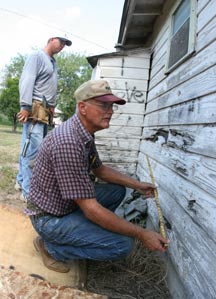Posted: 8/18/06
Sloan elected as Houston
Baptist University president
By Ken Camp
Managing Editor
HOUSTON—After 10 years as Baylor University’s president—the last few marked by deep division among the Waco school’s varied constituencies—Robert Sloan never thought he would want to lead another university.
But at an Aug. 8 called meeting, Houston Baptist Univer-sity’s trustees overwhelmingly elected Sloan, 57, as president of their 2,300-student school, effective Sept. 1.
|
| Robert Sloan becomes president of Houston Baptist University Sept. 1. Trustees elected him at a called meeting Aug. 8. Sloan served 10 years as Baylor University’s president. |
And Sloan, who has been Baylor’s chancellor since stepping down from the president’s post at the country’s largest Baptist university last year, expressed excitement about the future—both for HBU and personally.
Sloan served as Baylor University’s president from 1995 to 2005—a period marked both by significant expansion on campus and bitter polarization within “the Baylor family.” The Baylor Faculty Senate twice gave him “no confidence” votes, and the regents voted three times on Sloan’s continued employment—once coming within one vote of removing him from office.
Most of the criticism centered on Baylor 2012—the university’s long-range plan to become a top-tier national school—and Sloan’s implementation of it. Supporters praised his ambitious vision that blended a commitment to strong Christian faith and high academic standards. Critics accused Sloan of alienating longtime faculty, incurring significant debt, sacrificing classroom teaching in favor of research and raising tuition beyond the reach of typical Texas Baptist families.
“For the longest time, I didn’t think I ever would want to be a college president again,” he acknowledged.
After he resigned the president’s post at Baylor under pressure, Sloan said he and his wife, Sue, “did a lot of talking and praying” about what he should do next.
“For a while, I really thought I might return to the pastorate,” he said, noting he also considered politics and explored business possibilities. “But I realized the deepest passion of my life is still Christian higher education.”
Once Sloan began conversations with the HBU search committee, he grew increasingly impressed by what the Houston school had accomplished in less than 50 years of its existence and intrigued by what it could become in the future.
Sloan said he was “deeply impressed by the vision of the trustees, the dedication of the faculty and staff, the energy of the students and the remarkable level of commitment on the part of Houston Baptist University alumni.”
One of the biggest factors in his decision, he noted, was the city of Houston itself. “When you look across the country, there are very few Protestant evangelical universities in major urban centers. … The prospect of serving this remarkable, dynamic, young university in the nation’s fourth-largest city is exciting,” he said.
HBU Trustee Chair Ray Cox said it was “amazing to witness God’s hand guiding” the presidential selection process. He characterized Sloan as “a renowned Christian educator, scholar and author” who “possesses the leadership skills and vision for Christian higher education that make him the perfect choice to lead HBU into the future.”
Trustees were “not looking for a cookie-cutter plan that looked a lot like 2012. This is a different type of university in a different type of city,” Cox said. But, he added, they felt HBU was “well-poised for that type of vision.”
HBU has a $76 million endowment, a $35 million annual budget and 2,300 students. In contrast, Baylor has a $700 million endowment, a $350 million budget and 14,000 students.
Mark Denison, a search committee member and pastor of First Baptist Church in Gainesville, noted: “The issues at Baylor are not the issues we’re dealing with at HBU. We’re at different places. The issues that became burdensome in Waco are not issues here.”
But the committee became convinced that through the turmoil at Baylor, Sloan demonstrated he was “a man of high integrity and character” and would be “a better leader because of it,” he noted.
Denison cited five factors that convinced the committee Sloan was the right choice to “lead HBU to the next level”—his academic accomplishments, proven fund-raising ability, track record of leadership, commitment to Baptist heritage and exemplary family.
“We have the right man for the right place at the right time,” Denison said.
Search committee Chair Diane Williams called it “a coup for our university to bring a man with such great credentials” as Sloan’s.
“He and his wife, Sue, will be an asset not only to HBU but to the larger Houston community,” she said. “The search committee has been overwhelmed by the positive response we have received from the HBU administration, faculty, staff, alumni and students, as well as university friends who met with the Sloans. … We look forward with expectancy to the future and to the leadership of Robert Sloan.”
Sloan succeeds Doug Hodo, who served as HBU president from 1987 until his retirement in July 2006. Jack Carlson, former SYSCO executive and member of the HBU board of trustees, began service as interim president Aug. 1 and will continue in the role until Sloan assumes the presidency.
Hodo praised the trustees’ decision.
“Robert Sloan is a man known for his integrity. His experience in Christian higher education will be a tremendous asset for HBU, its students, alumni, faculty and staff. I consider him a colleague and friend,” Hodo said. “Each chapter in the life of a university has special significance, and with Robert’s leadership, the opportunities are unlimited.”
During Hodo’s tenure, HBU loosened its historic ties to the Baptist General Convention of Texas and established a fraternal relationship with the Southern Baptists of Texas Convention, a fundamentalist group that broke away from the mainstream state convention.
The BGCT continues to elect one-fourth of HBU’s trustees and provides about $550,000 annually to the school. While some SBTC-affiliated churches support HBU financially, the breakaway convention does not.
Sloan expressed hope that he can strengthen ties to the BGCT, but he does not anticipate any change in HBU’s relationship with the SBTC.
“I love the BGCT,” he said. “I love the Baptist family. I am Baptist from the heart and by conviction.”
Asked if his election sent any signal regarding the relationship between HBU and Texas Baptists, he replied: “I hope it affirms that (relationship) and that it deepens and extends it. I long for the day when we can work together with all Texas Baptists. I am committed to cooperating with all those of like faith and commitment.”
Underscoring his desire to reach out to varying constituencies in Baptist life, Sloan said he hopes HBU can focus on its mission and “go beyond labeling and the things that divide us and to be as inclusive as possible.”
During his time at Baylor, one evidence of division was the strained relationship that developed between Sloan and many longtime faculty. But faculty leaders at HBU voiced nothing but optimism about their new president.
Brenda Whaley, associate professor of biology and former president of the HBU faculty assembly, served on the presidential search advisory committee. Faculty members who met with Sloan were encouraged by his openness, she noted.
“We were every impressed with his honesty in talking about some of the things that went on at Baylor,” she said. “We saw a lot of integrity and character. And he was very affirming of the role of faculty. He exhibited so much respect for what the faculty do.”
David Capes, chair of HBU’s Christianity and philosophy department, praised Sloan as “one of the best teachers I ever had.”
Sloan “knows how to learn, how to teach and how to love students,” Capes said. “We need a strong academic as president of HBU to meet the challenges ahead. Dr. Sloan is that kind of leader. He is a man of vision, and he knows how to articulate that vision in such a way that people want to come along. Our best days are ahead.”
Regarding his vision for HBU, Sloan offered few specifics. Instead, he said he wants to spend the next couple of years listening to faculty, staff, students and alumni to learn more about the school.
Before becoming Baylor’s president, Sloan was dean of the university’s Truett Theological Seminary. He served on the Baylor religion faculty from 1983 to 1995, and he taught at Southwestern Baptist Theological Seminary from 1980 to 1983.
Sloan—who was born in Coleman and grew up in Abilene—holds a bachelor’s degree from Baylor, a master of divinity degree from Princeton Theological Seminary and a doctorate in theology from the University of Basel, Switzerland.
Sloan has served as pastor or interim pastor at more than 20 churches throughout Texas and Oklahoma—including nearly two years as interim at Tallowood Baptist Church in Houston.
Duane Brooks, pastor of Tallowood Baptist Church, voiced “the highest regard” for Sloan as his former teacher and friend.
“His love for the Scriptures still resonates in the hearts of the people at Tallowood,” Brooks said.
“This is good news for Houston Baptist University and good news for the city of Houston. Dr. Sloan will make a difference in the community. … This is a great day for all who love HBU.”
News of religion, faith, missions, Bible study and Christian ministry among Texas Baptist churches, in the BGCT, the Southern Baptist Convention ( SBC ) and around the world.









